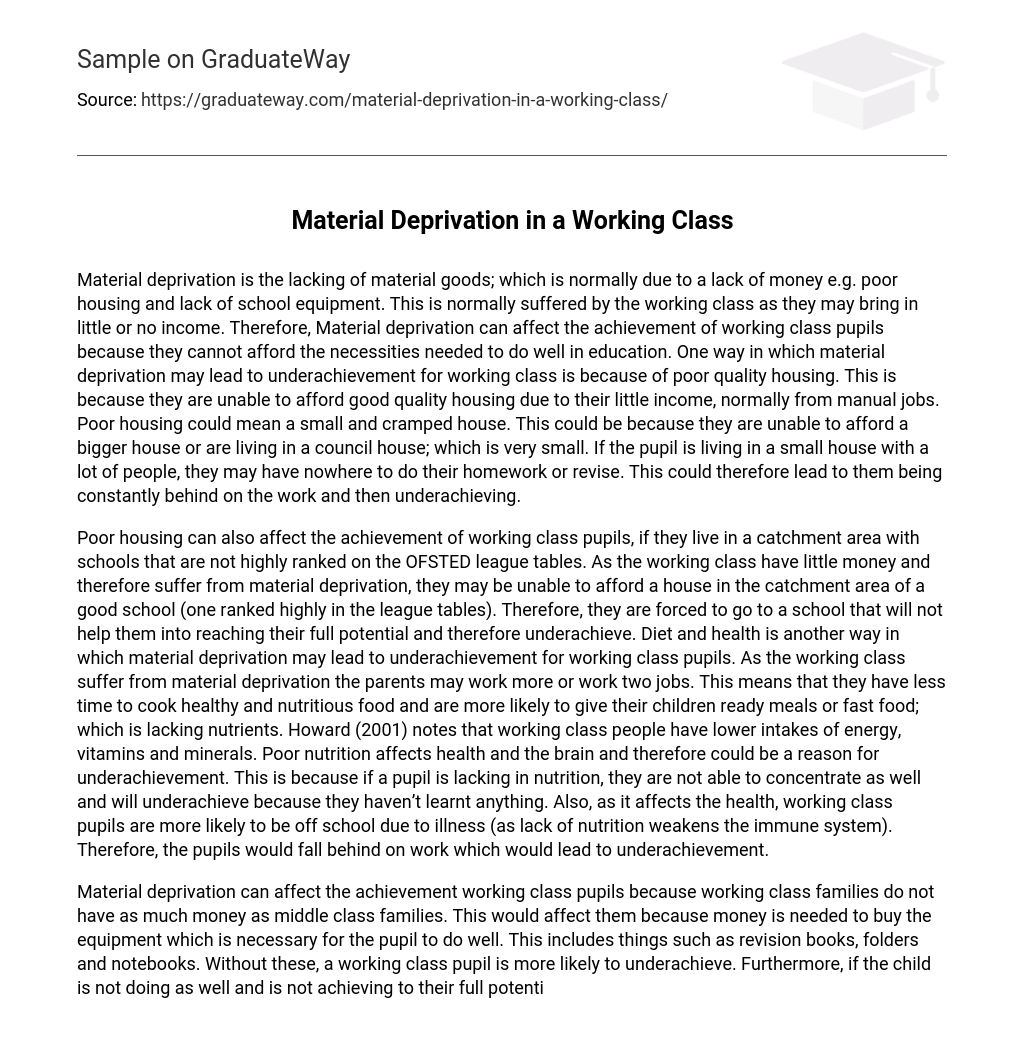Material deprivation, caused by a lack of financial resources, refers to the absence of material goods and is commonly experienced by the working class who have limited or no income. This can negatively impact academic achievement as working class students cannot afford necessary resources for successful education. Inadequate housing conditions, a result of low income, contribute to underachievement. Working class individuals often live in cramped and substandard spaces due to inability to afford better housing options. Consequently, students in such conditions lack suitable environments for studying, completing homework, or revising, leading to consistent academic struggles.
Substandard housing can impact the academic performance of working class students, especially if they live in an area with lower-rated schools according to OFSTED league tables. Limited finances often prevent working class families from affording a residence within the catchment area of a top-ranking school. Consequently, their children end up attending schools that do not provide equal opportunities for success, ultimately leading to underachievement.
Furthermore, material deprivation affects the dietary habits and overall health of working class students. Insufficient resources often result in parents having to work longer hours, leaving less time for preparing nutritious meals. As a result, these children tend to consume pre-made meals or fast food options that lack essential nutrients. Howard (2001) states that individuals from working class backgrounds have lower intakes of energy, vitamins, and minerals. Inadequate nutrition not only impacts physical well-being but also hampers cognitive abilities and potentially contributes to underperformance.
When students do not receive sufficient nourishment, their ability to focus is compromised, resulting in reduced levels of learning and achievement. Additionally, weakened immune systems caused by inadequate nutrition make working class pupils more prone to illnesses which lead to school absences and further setbacks academically.
Working class students may experience negative consequences on their academic performance due to a lack of financial resources compared to their middle-class counterparts. This lack of funds can hinder their ability to afford necessary educational materials such as revision books, folders, and notebooks. Without these resources, working class pupils are more likely to underperform in school. Furthermore, if a working class student is not achieving at their full potential, their parents may be unable to financially support additional tutoring, which sets them apart from middle-class students who have access to this extra assistance. As a result, this situation can contribute to a cycle of underachievement.
In addition to material deprivation, other factors also contribute to the underperformance of working class students. One factor is cultural deprivation which manifests itself in various ways including language codes. Bereiter and Engelmann emphasize the importance of language development for educational success and argue that households from working class backgrounds often lack adequate language skills. They refer to this deficiency as the restricted code characterized by gestures, single words, and fragmented phrases. Consequently, children from working class backgrounds may struggle with acquiring the necessary language skills needed for academic achievement.
Working class students often face challenges in education due to their limited capacity for abstract thinking and their ineffective use of language for explanation, description, and comparison. As a result, they struggle to fully exploit available educational opportunities, leading to underperformance. The underachievement of working class pupils can be primarily attributed to material deprivation arising from insufficient housing, nutrition, healthcare, and education-related financial constraints. These circumstances impede the child’s educational advancement and hinder their ability to reach their maximum potential. However, cultural deprivation, which encompasses language codes as well, can also contribute to the underperformance of working class students.





